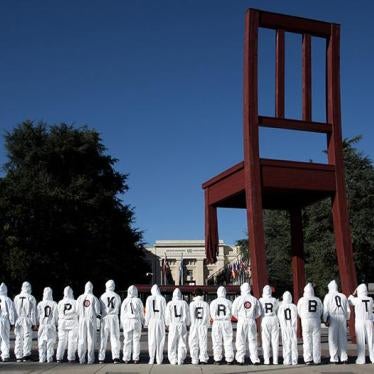Mr. Chair, the Campaign to Stop Killer Robots sincerely appreciates all the work that has gone into producing these recommendations for the draft report of the 2019 Group of Governmental Experts (GGE) and would like to provide a few brief comments on them. The recommendations matter because the last CCW Review Conference tasked this Group to consider and recommend “options” for addressing emerging technologies in the area of lethal autonomous weapons systems.
The final paragraph of the recommendations calls for the next two years of discussion to lead to a report to the 2021 Review Conference that would “continue the clarification and development of normative and operational frameworks.”
We welcome the recommendation to increase the period of time allocated to these GGE talks over the next two years. However, without a stronger mandate we are concerned that this will mean two more years of talk without concrete actions.
The recommendation to focus on “normative and operational frameworks” is unambitious to us because it does not explicitly call for a legally binding instrument. In addition, it is still unclear what such frameworks actually are or what the timeframe should be for their negotiation.
Constructive ambiguity may aid diplomacy here at the CCW, but will do little to quell growing public concerns and rising expectations that states will take strong action on this serious challenge.
By accepting this vague recommendation, the GGE would embrace ambiguity, postpone decisions about the ultimate goal of this process, and fail to show a clear way forward for dealing with killer robots.
Mr. Chair, we’re deeply concerned by the downplaying of human control here at the CCW. The need to retain some form of human control over the use of force and critical functions of weapons systems has dominated discussions in the forum since these talks began in 2014. More than a dozen states have raised the importance of this today. We welcome the new reference to human control in paragraph 24(d) of the latest draft report’s recommendations.
Finally, we see very limited attention to ethical, moral, humanitarian and human rights dimensions in these recommendations. The draft report calls for work into legal, technological, and military streams, but it downplays those broader considerations.
While the latest version adds a reference to “ethical acceptability,” much more attention should be drawn to these considerations given that they have been widely raised. Today the Holy See and a dozen states have referred to the need to address ethical and moral considerations.
We encourage High Contracting Parties to the CCW to be bolder and stronger: recommend a mandate to negotiate a new legally binding instrument on lethal autonomous weapons systems, as so many states have requested over the years. The CCW must produce a credible result.







